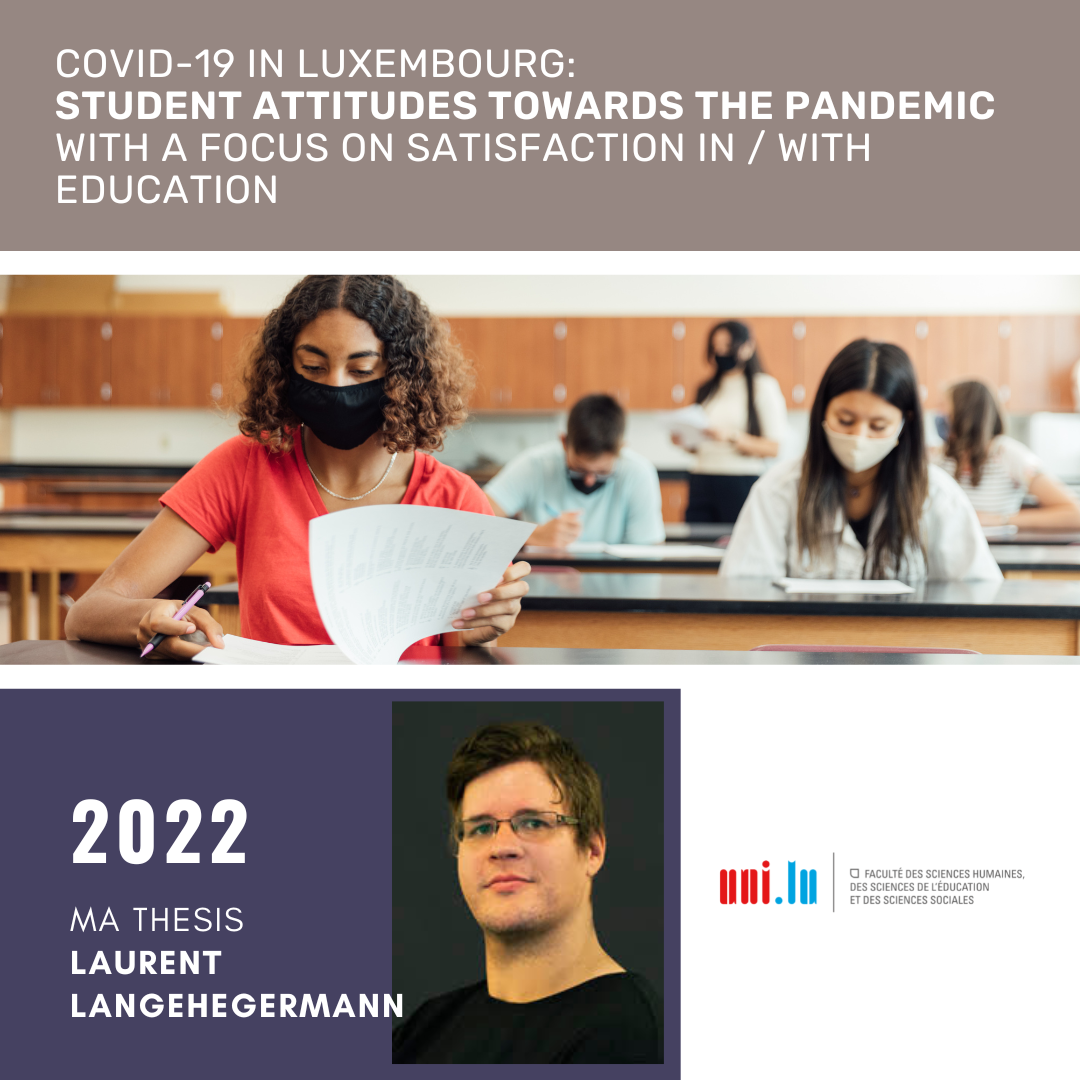Prof. Dr Robin Samuel is Associate Professor and Director of the Center for Childhood and Youth Research (CCY) at the University of Luxembourg.
Dissertations
Dissertations
Data from the Youth Survey Luxembourg, as well as from the study Young People and COVID-19 (YAC) enabled Laurent Langehegermann to investigate the satisfaction of pupils and students in Luxembourg during the COVID-19 pandemic. He wrote his Master’s thesis on this topic, entitled “COVID-19 in Lux-embourg: Student attitudes towards the pandemic with a focus on satisfaction in/with education”. He was supervised by Prof. Dr. Robin Samuel and successfully completed his Master’s degree at the Uni-versity of Luxembourg in 2022. In an interview with youth-in-luxembourg.lu, Laurent gives an insight into his research, and thus into “Luxembourg’s Covid Curriculum”.

My master’s thesis is a quantitative study on the coping with the COVID-19 pandemic in Luxembourg by pupils and students and their satisfaction in 2020 and 2021. For the data analysis, I used correlation tables and coefficient plots derived from Ordinary Least Squares (OLS) and logistic regressions.
The research questions I answered were:
I used secondary data generated by the YAC 2020 and YAC 2021 datasets, which were provided to me by Robin Samuel and his team of researchers at the Centre for Childhood and Youth Research (CCY).
The students whose attitudes I analysed were between the ages of 14 and 29, due to the structure of the datasets I treated. The considered survey participants attended secondary, vocational, and tertiary educational institutions either in Luxembourg or abroad.
I used a theoretical framework based on organizational imprinting and path dependence:
Organizational imprinting is said to occur after “sensitive periods” (Marquis and Tilcsik, 2013: 199), in which organizations are more willing to change due to external factors. In the case of my research, the organizations in question were a number of Luxembourg’s educational institutions in the context of the COVID-19 pandemic.
Similarly, it is important to consider path dependence as a concept that explains the prevalence and pertinence of rules, approaches, and infrastructures as consequences of decisions made in the past. While the digital means had already been available, educational institutions insisted on preserving on-site teaching amid the ongoing pandemic.
Results show that overall, the student situation in Luxembourg was consistent with other Western European countries, such as Germany, France, and Austria. Everywhere students indicated that they were mostly satisfied with how their respective educational institutions responded to the exceptional situation of the COVID-19 pandemic.
Potentially exceptional for Luxembourg, however, is the fact that while still overall satisfied, university students were those that liked the change towards online environments the least. Between 2020 and 2021, students strongly missed face-to-face interaction with their educators and their peers. Instead, they often had to attend classes virtually. Nevertheless, my results indicated that in Luxembourg, educational satisfaction did not noticeably diminish with the switch to the virtual classrooms.
In detail, clarity in education and trust in their educators served as major influences on how students were coping with the pandemic. Survey participants indicated that the more they could trust their respective teachers to treat them fairly and provide them with clearly explained assignments and access to close to immediate help (through chatrooms, Teams, Discord, etc.) the better they coped with the pandemic situation and the more satisfied they were.
Similarly, physical factors and mental health factors were indicated as important for both coping and satisfaction with education. That is to say that those participants that believed themselves to be in control of their own situation, those that were physically active, and those that believed they can overcome difficult tasks were handling the situation better than those who felt isolated or lacked closeness with other people.
Digital factors, such as computers owned at home and time spent interacting with people online, apart from disconnecting from social media, do not tell us much about coping or satisfaction in 2020. They only started to show statistical relevance one year into the pandemic in 2021, even with students already indicating a favourable disposition towards digital learning methods before 2021.
Based on my findings, I argue that future research needs to delve deeper into the topic of student satisfaction and how this could lead to educational institutions’ embracing digital measures. Students in Luxembourg, for their part, have shown a positive attitude towards digital teaching methods, followed by a willingness to embrace them.
The Youth Surveys conducted in Luxembourg clearly show that students and other young people in Luxembourg spend an extended period of their free time being digitally active, highlighting that they are aware of the potential digitalisation offers.
The unexpected field test the COVID-19 pandemic offered needs to be deeply analysed and accounted for in any following reforms at any level of the Luxembourgish school system, especially concerning the implementation of digital measures in education.
Prof. Dr Robin Samuel is Associate Professor and Director of the Center for Childhood and Youth Research (CCY) at the University of Luxembourg.